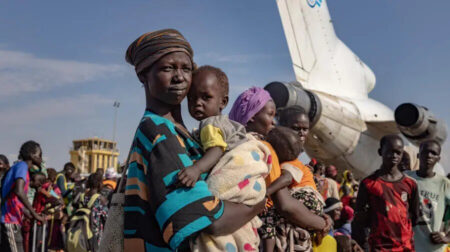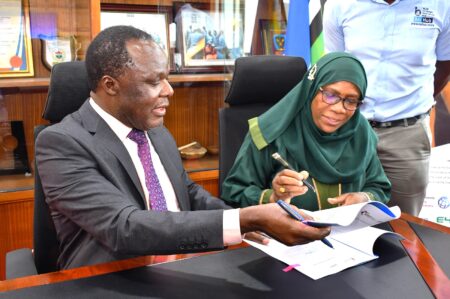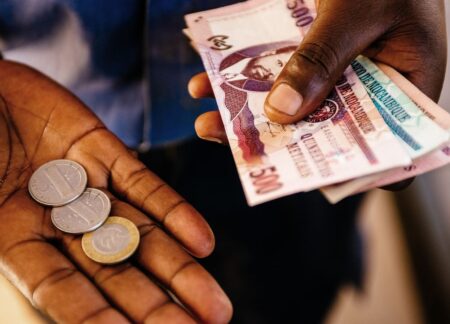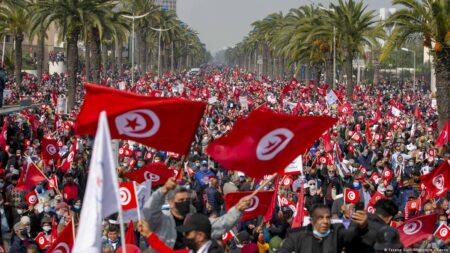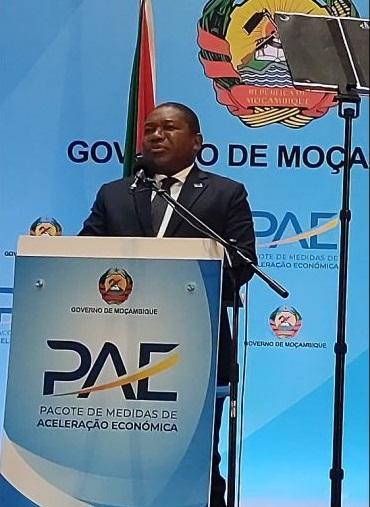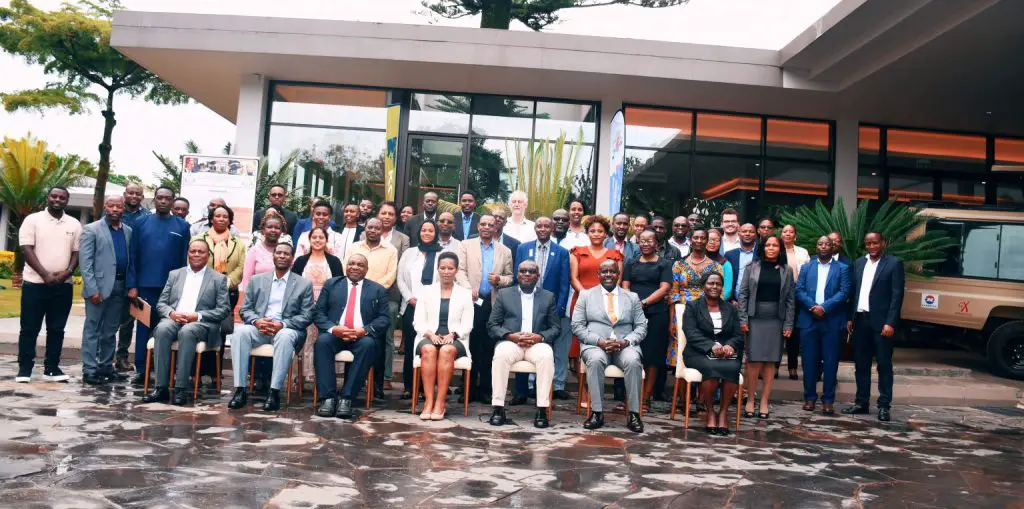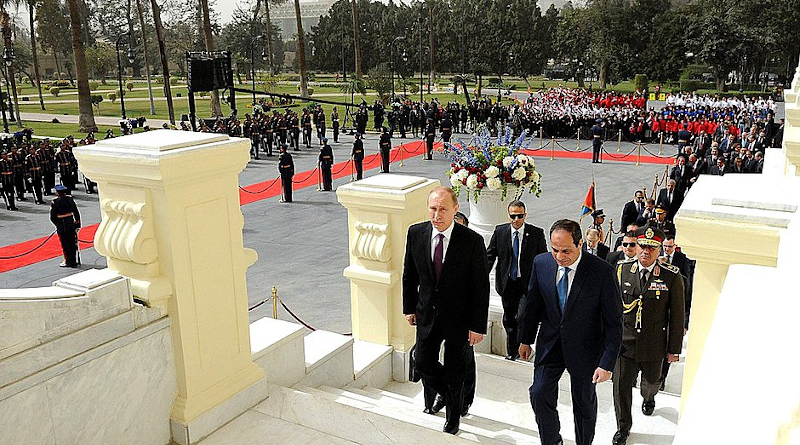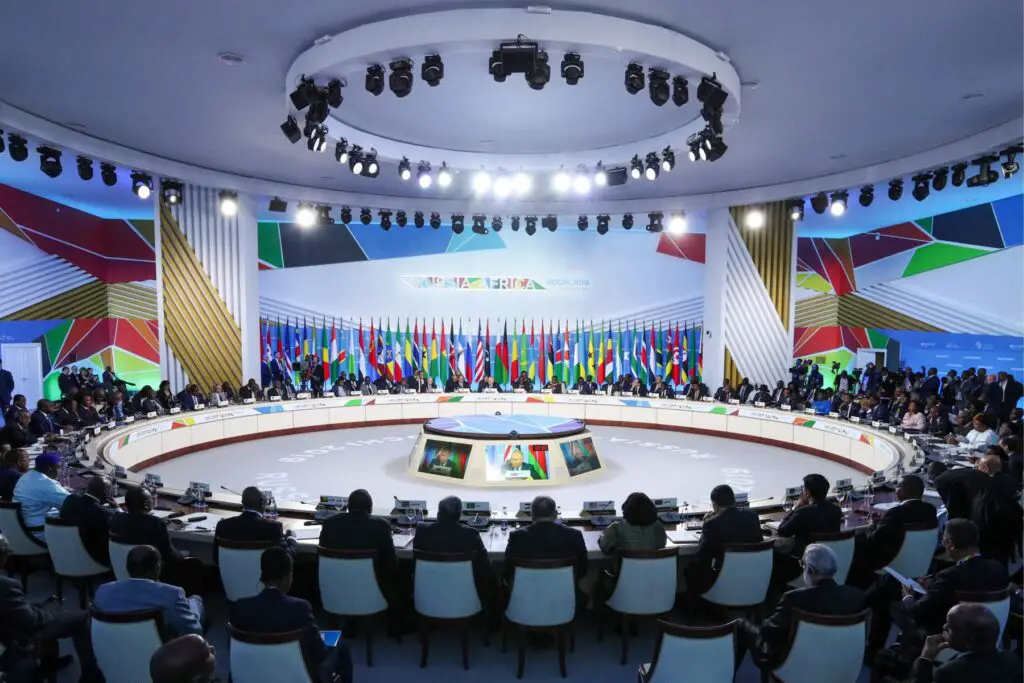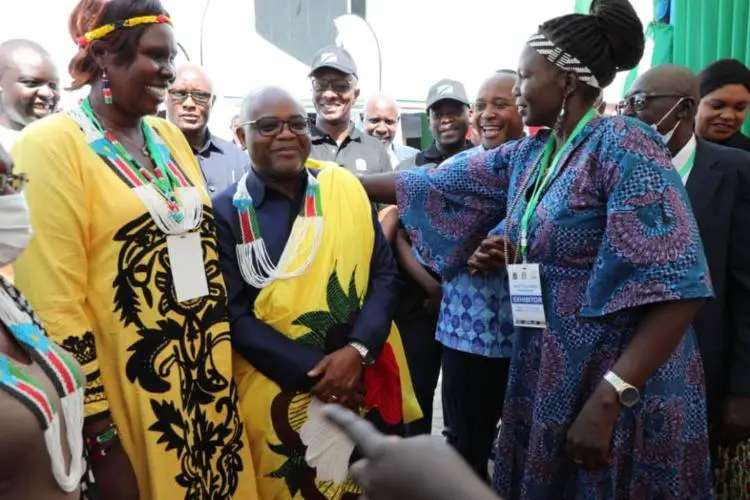- Africa’s new dawn: the rising role of digital and AI in agriculture
- Can Dangote Refinery Transform Africa Energy Ambition
- Gallup Survey: 80 per cent of Kenyan Workers Are Disengaged and Seek New Opportunities
- Madagascar Man Freed from 5KG Tumor After 15-Year Struggle
- How women in Africa are perceived and treated
- Sugar consumption in Kenya to Increase to 1.23 Million Tonnes
- Can Somalia and Turkey Oil deal Bring Change in Somaliland
- Remittances to Kenya dropped to $371.6 million in June, marking a six month low
Browsing: economic development
- Over a decade since gaining independence, South Sudan continues to be affected by fragility, economic stagnation, and instability.
- South Sudan’s economy is clouded by production bottlenecks in the oil sector, with production dwindling in the face of limited new investment.
- The susceptibility of South Sudan to climate change and natural calamities exacerbates the nation’s economic challenges, threatening the progress of growth and development initiatives.
The Republic of South Sudan emerged as the world’s newest sovereign state and the 54th country in Africa on July 9, 2011. However, the progress of development post-independence was significantly hampered by civil war outbreaks in 2013 and 2016, which also aggravated the humanitarian crisis.
Over a decade since gaining independence, South Sudan continues to be affected by fragility, economic stagnation, and instability. Pervasive poverty is further intensified by ongoing conflict, displacement, and external shocks.
Crisis facing the oil and energy sector
Oil production is …
- Eight Kenyan universities have been selected as part of the World Bank’s $55.8 million SME formalisation project.
- In the World Bank plan, 267 young innovators’ students, 10 incubators, 10 accelerators, and 4 tech boot camp providers will be funded.
- The SKIES initiative started with a call for applications that attracted a total of 142 incubators.
Eight Kenyan universities have been selected as part of the World Bank’s $55.8 million (KES7.5 billion) SME formalisation project to provide business development services to micro, small and medium enterprises. Kenya Industrial Entrepreneurship Project will implement the program through the Strengthening Kenya’s Innovation Ecosystem (SKIES).
The government, through SKIES, a subcomponent of the Sh7.5 billion (KIEP) project, seeks to streamline the delivery of professional business development services, thereby enabling innovators of small and medium enterprises to get the proper business training when required.
The absence of a uniform platform to oversee the start-up ecosystem in …
- Intra-African Payment Systems is expected to simplify trade among member states on the platform.
- In West Africa Nigeria, Ghana, Guinea, Gambia, Liberia, and Sierra Leone have joined the Intra-African Payment Systems.
- 3 Countries in East Africa, Kenya, Rwanda, and Djibouti are among the early members of Intra-African Payment Systems.
The push for a single trading platform for African countries is gathering pace after tnike air max 90 futura jordan max aura 4 custom maple leafs jersey dallas cowboys slippers mens blundstone uomo yeezy boost 350 v2 hyperspace custom stitched nfl jersey jordan proto max 720 custom kings jersey dallas cowboys slippers mens penn state jersey deuce vaughn jersey air jordan 1 low flyease luvme human hair wigs sac eastpak he Pan African Payment and Settlement System (PAPSS) enrolled the Central Bank of Tunisia (Banque Centrale de Tunisie) as its thirteenth Central Bank member.
The move is seen as a …
- The new partnership is aimed at creating quality jobs and boosting resilience to climate change.
- The strategy aims at improved resilience to climate change and reduced carbon emissions.
- Agreement will enhance the resilience and competitiveness of the private sector to create jobs.
The World Bank Group has announced a new five-year Country Partnership Framework (CPF) with Tunisia that supports the government’s development plan to expand the economy and tackle climate change. The new partnership aims at creating quality jobs, and boosting resilience to climate change.
The strategy was discussed with the World Bank Group’s Board of Directors and provides direction for the Bank Group to continue playing its role as a long-term partner of the country and its people.
Tunisia Vision 2035
“This new strategy provides the basis for the World Bank and Tunisia to accelerate programs to help unleash the country’s economic potential and foster a better future for …
The PAE – Economic Acceleration Stimulus Package consists of 22 measures divided into two sets of reforms, the first being fiscal and economic stimulus and the second the improvement of its business environment, transparency, governance, and the acceleration of strategic infrastructure.
The fiscal and economic stimulus interventions include the reduction of selected taxes with a direct impact on the main productive sectors.
The measures announced lower the IRPC from 32 per cent to 10 per cent in agriculture, aquaculture, and public transport, and VAT from 17 per cent to 16 per cent and include a VAT exemption on imports for agriculture and electrification to boost renewable energy.
The Mozambican head of state also signalled the introduction of tax incentives for new investments over the next three years but did not mention the rates of these incentives.…
- The economy is now projected to grow by 4.6% during 2022, a downward revision from the original 5.5% projection
- Reserve money stock has increased to ZW$33.6 billion as of June 30, 2022.
- Merchandise exports and imports increased by 33% and 15% to US$3 516.5 million and US$3 746.8 million. Exports are expected to reach US$7.3 billion
- The country is doing well in terms of budget transparency and is now ranked third in Africa, after South Africa and Benin.
Zimbabwe’s Finance and Economic Development Minister, Mthuli Ncube, presented the 2022 supplementary budget on Thursday amid skyrocketing inflation that has since eroded this year’s national budget.
This is the first time that Minister Ncube has presented a supplementary budget since he was appointed Finance Minister by President Emmerson Mnangagwa in 2018.
The economy is now projected to grow by 4.6% during 2022, a downward revision from the original 5.5% projection, and follows …
- There is a huge need for business owners, policymakers, and African leaders, in general, to capitalise on the investment in more research, higher education and science
- Academic institutions need to build skills and knowledge of young professionals in areas of research, innovation, science and technology in order to benefit from the natural resources and improve the livelihoods of East Africans
- Africa has the strongest growing scientific production currently at 38.6 per cent since the start of 2012 with the number of authors subsequently growing at a slightly higher rate of 43 per cent over the same period
The Academic Public-Private Partnership Forum (APPPF) has called for more funding to be availed to Africa’s researchers and innovators. This will largely drive up the continent’s sustainable economic development.
According to data by statista.com, despite Africa comprising 12.5 per cent of the global population, the continent still only accounts for less than 1 …
In practical reality, it aims at creating a continental market for goods and services, with free movement of businesspeople and investments in Africa.
Several reports indicate that the summit strives to bring Africa and Europe closer together through strengthening economic cooperation and promoting sustainable development, with both continents co-existing in peace, security, democracy, prosperity, solidarity and human dignity.
It is against this backdrop that the two partners are determined to work together on a strategic, long-term footing to develop a shared vision for EU-Africa relations in a globalized world.…
Apart from the absence of a public strategy for the continent, there is a lack of coordination among various state and para-state institutions working with Africa.
Despite the growth of external players’ influence and presence in Africa, Russia has to intensify and redefine its parameters. Russia’s foreign policy strategy regarding Africa has to spell out and incorporate the development needs of African countries.
Unlike most competitors, Russia has to promote an understandable agenda for Africa: working more on sovereignty, continental integration, infrastructure development, human development (education and medicine), security (including the fight against hunger and epidemics), normal universal human values, the idea that people should live with dignity and feel protected.…
EAC Partner States still have a critical role in enabling MSMEs growth to ensure long term sustainability and recovery by promoting programmes that prioritise MSMEs to spur demand for quality finished goods and progressively improve the region’s competitiveness.
“As the Community, we have the responsibility of enabling MSMEs growth to ensure long term sustainability and recovery,” said Dr. Mathuki.
The EAC Official informed the Exhibitors that the theme for this year recognises the impact of the Covid-19 pandemic on trade and places greater emphasises on quality and innovation as critical paths to enhance competitiveness. …





